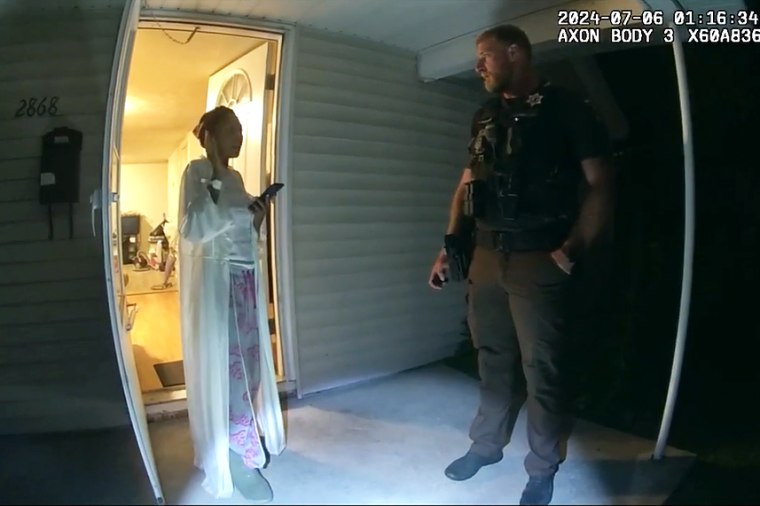SPRINGFIELD, Ill. — The Illinois sheriff whose deputy fatally shot Sonya Massey said Thursday that blame for her killing lay with the deputy alone.
Sangamon County Sheriff Jack Campbell said Sean Grayson, who has been fired and charged with murder, had been properly trained by his agency and acted against that instruction on July 6, when he shot and killed Massey in her home while responding to her call about a suspected prowler.
“He alone is responsible for this,” Campbell said in an interview with NBC News. “He failed to do what he was trained to do, what he had experience to do, what he’s equipped to do. He and he alone is responsible for that.”
Campbell, who has resisted calls to resign since the shooting, defended his office’s vetting of Grayson prior to his hiring.
“We were satisfied that he could work as a police officer in Illinois,” Campbell said. “There was nothing about his past that would decertify him or disqualify him to be a police officer. He had been hired by five other agencies prior to ours, certified by the state of Illinois six times, including us, to work as a police officer.”
Campbell said his office was not aware of documented issues with Grayson’s performance at previous agencies. But he refused to say whether he would have hired Grayson had he known, saying it would amount to speculation.
Grayson worked for six law enforcement agencies in central Illinois in four years, in both part-time and full-time roles, before he was hired by Sangamon County, according to the Illinois Law Enforcement Training and Standards Board. He sometimes worked two part-time law enforcement jobs at once, the board’s records show.
Campbell described this as “a typical path” for an officer who wants to work at a larger department where the prospect of earning a higher income is greater. He said that Grayson had completed enough training at a part-time police academy before he began working in Sangamon County to work legally in the state, but that he required Grayson to complete an additional 16 weeks of training.
“He had everything he needed. He failed,” Campbell said. “This is his fault.”
Grayson’s military background and employment history have come under scrutiny since his arrest. His employment file from the Logan County Sheriff’s Office, where he worked before he was hired by the Sangamon County Sheriff’s Office, included a reprimand from his superiors over his disregard for an order to end a pursuit, complaints from people he had arrested, and indications that he had been warned on more than one occasion about inaccuracies in his reports.
Campbell said Logan County had not made his office aware of that information. The Logan County Sheriff’s Office did not return a request for comment.
“It’s unfortunate. We needed information and it’s a informal process,” Campbell said. “We call and check references on the phone and things like that. And it simply — it was not provided.”
Grayson also twice pleaded guilty to driving under the influence of alcohol, once in 2015, while he was in the Army, and again in 2016, after his discharge. The first DUI led the Army to dismiss him in February 2016, two sources previously told NBC News. The sources said the Army was also was aware at the time that officers said a gun had been found in the center console of Grayson’s vehicle when he was pulled over. His Army discharge paperwork lists his reason for separation as “misconduct, (serious offense).”
Campbell said the DUIs did not concern him because he believes “it’s understandable,” that it could happen to anyone and because Grayson had later established a work history in law enforcement.
“Two DUIs is not a good indicator of a violent act that would occur just nine years later,” he said.
On Wednesday, in response to public records requests, Campbell released Grayson’s employment record and 911 calls.
Among other things, the documents reveal that the county’s background investigation into Grayson during the hiring process included comments from two past employers who said he needed more training; that the former deputy received a letter of recommendation from a retired Sangamon County deputy — his then-girlfriend’s father; and that Massey’s mother had called 911 the day before she died and urged a dispatcher not to send combative officers to her door for fear they might make things worse.
In the days leading up to Massey’s death, two emergency calls were made from her home, according to records released Wednesday.

In one of the recordings, Massey’s mother, Donna Massey, tells a 911 dispatcher that her daughter was having a “mental breakdown,” but that she was not suicidal and she did not pose a danger to herself or to anyone else.
“I don’t want you guys to hurt her, please,” Donna Massey tells the dispatcher, according to the recording. And she urges the dispatcher not to send “combative policemen that are prejudiced.”
“OK. Well, that would be none of ‘em,” the dispatcher assures her. “They just do their job.”
Donna Massey tells him that she is scared of the police and the dispatcher says, “There’s nothing to be fearful of, ma’am.”
When asked about the recording Thursday, Campbell said that it concerned him, but that he hadn’t heard it. Campbell said Grayson and the other deputy who responded were not aware of Donna Massey’s call before they went to Massey’s home.
Campbell, a 30-year law enforcement veteran, said he felt mortified when he first watched the body camera video.
“As soon as I saw it, I knew that the storm ahead was going to be a hard one,” he said, and it led him to question: “How could a person that’s been properly trained and had experience, how could he commit such a violent act? He should have known better.”
Campbell said the department will look to revamp its hiring process.
“When somebody applies, we’re going to look for a reason not to hire them,” he said. “We’re going to kind of do a reverse psychology here and try to not hire them. That is one of our goals here.”
Campbell fired Grayson nearly two weeks after he killed Massey in her home in Springfield, 200 miles southwest of Chicago. Grayson and another deputy, who has not been identified, responded to her home after she called for help and Grayson shot her in a dispute over a pot of water. Grayson said he felt threatened by the water, which he said was hot, but prosecutors have said the use of force was not justified.
Grayson, 30, who is white, is charged with first-degree murder, aggravated battery with a firearm and official misconduct. He has pleaded not guilty and is jailed without bond. His attorney, Dan Fultz, declined to comment Thursday.
Massey’s family members are among the many who have questioned how Grayson was allowed to work in law enforcement and have called on Campbell to resign. He said he will not.
“I understand the pain, that they’re hurting and they want to hold somebody accountable,” he said. “We are holding somebody accountable. That is Sean Grayson. He did this. He alone did this.”
Maggie Vespa reported from Springfield, Ill. Janelle Griffith reported from New Jersey.
,









